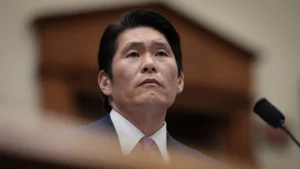⚡ Cutting through noise. Spotlighting the truth.
Biden Classified Documents Raise Deeper Concerns

It’s not just the content of the Biden classified documents making headlines—it’s what they reveal about leadership, judgment, and trust. In early 2024, Special Counsel Robert Hur released a report detailing how President Joe Biden retained and shared sensitive materials after his vice presidency. Although Hur declined prosecution, the fallout has intensified, especially after the 2025 release of Biden’s interview audio.
The result? A new wave of scrutiny about Biden’s cognitive fitness and fresh debate over the glaring double standards in how justice is applied depending on political affiliation—or age.
The Audio That Changed the Conversation
The release of Biden’s five-hour interview with Hur in May 2025 added fuel to an already smoldering controversy. Throughout the recording, Biden struggled with dates, paused frequently, and appeared disoriented when discussing events after his vice presidency.
According to Axios and Politico, the tone of the audio aligned with the now-infamous line from Hur’s written report, describing Biden as a “sympathetic, well-meaning, elderly man with a poor memory.” That line—used to explain why charges weren’t pursued—sparked bipartisan backlash. Republicans called it proof Biden is unfit for office. Democrats said it was ageist spin.
But the voice on the tape didn’t leave much room for interpretation. It sounded like a man no longer fully in command, and that raised questions Americans can’t afford to ignore.
Key Trend: Biden Classified Documents Fuel Trust Gap
The Biden classified documents case quickly became a lightning rod for Republicans pointing to institutional bias. Compared with the aggressive prosecution of Donald Trump over similar violations, the contrast is stark.
Hur made it clear: Biden had indeed retained and disclosed classified information. But his age and confusion, Hur argued, would likely sway a jury against conviction. “It would be difficult to convince a jury,” Hur wrote, “to convict a well-meaning elderly man with memory issues.”
This logic may fly in a courtroom, but it lands differently in public. If a president is too forgetful to charge with a crime, is he too forgetful to lead? It’s a question more Americans are asking—especially when the rules seem to shift based on party or perception.
The treatment of this case compared to Trump’s is just one example of what we covered in our piece on CNN media bias, where media narratives soften scrutiny for the left and inflame it for the right.
Legal Logic or Political Cover?
Hur’s rationale for not prosecuting is legally sound on paper. Federal law requires proof of willful intent in mishandling classified information. Hur concluded Biden’s apparent mental lapses and advanced age would undermine the case in court.
His report stated, “It would be difficult to convince a jury that they should convict him … of a serious felony that requires a mental state of willfulness.”
But while that may satisfy DOJ standards, it doesn’t answer the bigger question: if the president isn’t competent enough to be held legally responsible, what does that say about his ability to carry out the duties of the office?
This is where public perception splits sharply from legal analysis. Justice isn’t only about law—it’s about trust. And right now, that trust is fading.
Media Coverage Follows Familiar Pattern
Mainstream outlets once again fell into predictable lines. Progressive voices praised Hur’s restraint and emphasized the lack of intent. Conservative commentators focused on the transcript, the audio, and the bigger implications: Biden’s cognitive decline isn’t just about documents—it’s about duty.
Politico and Axios both covered the story factually. But the framing from networks like CNN mirrored what we saw during the Hunter Biden laptop coverage—delay, distraction, and defense.
We unpacked that strategy before in our article on the media’s strategic omissions, and this story fits the pattern. Real issues are buried beneath endless pundit spin.
Even moderates admit the whole situation feels rigged. Hur may have followed the law, but the outcome feeds the narrative that accountability is subjective if you’re on the right team—or the right age.
Expert Insights: Hur’s Words Were the Trigger
Special Counsel Robert Hur didn’t just decline to prosecute. His words reshaped the public debate.
“It would be difficult to convince a jury,” he wrote, “to convict a well-meaning elderly man with a poor memory.”
That line wasn’t just clinical—it was explosive. It made Biden’s mental state a national issue, not just a legal one. Whether or not that was Hur’s intent, it’s the reality now.
Contrasting Views: Fair Report or Softball Pass?
To Republicans, the Biden classified documents saga is simple: if Trump had said these things in an interview, he’d be in a cell.
They argue that Biden’s conduct—retaining classified materials, then struggling to remember it—would have been disqualifying for any Republican. They see the lack of prosecution not as mercy, but as privilege.
Democrats, meanwhile, defend Hur’s conclusions. They argue there was no criminal intent, and the law was followed. But even within party ranks, concerns are rising about Biden’s electability and fitness for a second term.
The contrast couldn’t be sharper. Biden got the benefit of the doubt. Trump got 37 counts. Americans see the difference, and they’re not buying the excuses.
This echoes what we explored in Secretary Rubio’s Senate testimony analysis, where selective outrage reveals just how deep the double standards run.
Readers Also Asked
Why did Robert Hur decline to prosecute Biden over classified documents?
Because Hur believed Biden’s memory issues and age would likely prevent conviction. Critics argue that’s a dangerous new precedent—and it’s why trust in justice is eroding.
What did the audio of Biden’s Hur interview reveal?
The tape captured memory lapses and confusion. It didn’t sound like strong leadership, and that’s what’s unsettling voters.
How did Democrats and Republicans react to Hur’s report?
Republicans saw proof of bias. Democrats called it fair. But the public sees something else: selective justice, dressed up as legal nuance.
Wrap-Up
– The Biden classified documents case isn’t just about legality—it’s about leadership.
– Hur followed the law, but his findings revealed a deeper problem: a president in decline.
– The media’s selective coverage has only sharpened public skepticism.
– The message this sends about accountability could outlast the controversy itself.
This story won’t fade quietly. And the questions it raises may be louder than the answers.
Sources and Further Reading
Politico – Biden audio release reaction
Axios – Special Counsel audio fallout
DOJ – Hur Report PDF




